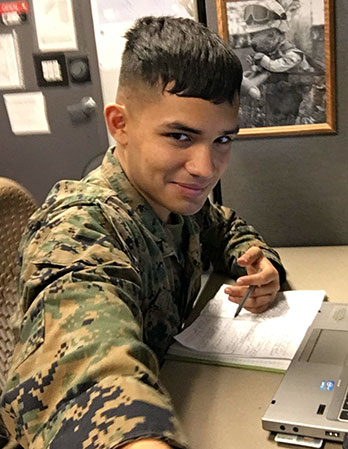Veterans are an important part of the Drexel University College of Computing & Informatics (CCI) community, with faculty and students having served in many different roles and branches of the U.S. military, and pursued military and civilian careers in the computing and information science fields. CCI's academic programs, particularly the BS in Computing and Security Technology program, are well suited to the expertise and experience possessed by active duty military personnel and veterans.
In celebration of Veterans Day on November 11, CCI is featuring two members of CCI’s veteran community. Read more to learn about their personal journeys and experiences while working and studying at Drexel:
 Andrew Calhoun, Assistant Teaching Professor, Information Science
Andrew Calhoun, Assistant Teaching Professor, Information Science
Air Force National Guard
CCI: Tell us about your career path. How did your military service influence or intersect with a career in cybersecurity?
AC: My career path did not start out in cybersecurity. I studied history and criminal justice in college and had aspirations to help reform our criminal justice system by becoming a lawyer or law enforcement officer. However, by the time I had graduated, my drive to pursue a career in law/law enforcement was overshadowed by my desire to serve in the military and become an entrepreneur. So, after college I joined the Air Force National Guard and started working on my MBA in hopes to one day start my own non-profit. While in graduate school, I began working in a Human Resources department with their information systems. I didn’t know it at the time, but the mixture of my military experience, where I handled classified information and worked on classified networks, coupled with my work with sensitive employee information in human resources, created my interest in cybersecurity. So much so that I took advantage of my company’s tuition reimbursement program to return to graduate school to pursue a cybersecurity degree. With an interest in cybersecurity, some formal education under my belt, and technical experience from my jobs, I decided to go all in on cybersecurity and make it my career focus. Now, I not only teach cybersecurity courses at Drexel, but work in cybersecurity as a government contractor at the Philadelphia Navy Yard and Cyber Operations Officer in the Air Force National Guard. I owe my military service for providing opportunities to advance in my STEM career.
CCI: What’s the environment like for veteran students and faculty at Drexel?
AC: As far as I can tell, the environment for veteran students and faculty at Drexel is a supportive one. Though there are veteran groups available on campus, I have not been involved in them as of yet; however, the fact that they exist tells me that Drexel is supportive of those that have served and provides resources for veterans. In my experience, my colleagues and management have respected my military service and value the experience I can bring into the classroom from having served.
CCI: What is some advice you’d give to servicemembers/veterans seeking to gain more education or skills in the STEM field? What are some of the challenges that servicemembers/veterans may face in transitioning to college life?
AC: First and foremost, veterans and servicemembers should know what education benefits they are entitled to. Often times gaining more education as a veteran/servicemember can be done affordably which eliminates a significant financial deterrent when deciding to return to school. You just have to understand your education benefits and how to use them. Ask as many questions as it takes to gain this understanding. Second, chances are that a servicemember/veteran transitioning to college may be older, or come from a different background than the traditional college student; this is not a negative, it is a positive. It means that the servicemember/veteran brings unique perspectives and experiences to the classroom. They can leverage this to add value to class discussions or group projects. Lean into that experience, don’t shy away from it because you didn’t start college right out of high school like many of your classmates. Lastly, the transition from military service to civilian life can be difficult. Always ask for help when you need it. Your fellow students, faculty, and professional staff will be happy to help, but they cannot help if they don’t know that help is needed. Don’t feel that asking for help is a sign of weakness, it’s far from it.
CCI: What are your thoughts on the role of the U.S. military as a potential pathway into STEM degrees and occupations?
AC: In my experience, the military is an excellent pathway into STEM degrees and occupations. Many jobs in the military revolve around STEM which gives those fortunate enough to be assigned those jobs a leg up. For example, the military has provided me paid training on networking, coding, penetration testing, and other technical topics. These skills are valuable when pursuing STEM career opportunities or seeking a STEM related degree. Even if your job in the military is not STEM related, the military still provides education benefits (i.e., GI Bill) that can be used when pursuing a STEM degree. Military experience is also coveted by many organizations that hire for STEM positions. I would say that the military sets anyone up to succeed if they choose to walk down the STEM path.
 Daniel Levine, BS Computing & Security Technology Student
Daniel Levine, BS Computing & Security Technology Student
U.S. Marine Corps
CCI: Tell us about your path from serving in the U.S. Marines to Drexel. How did your military service influence or intersect with pursuing a degree in a STEM field? How do you plan to apply your degree in your military career?
DL: While serving in the Marine Corps, I was an intelligence specialist at an Infantry Battalion. Through that capacity, I was the designated "systems Marine" for my office which led me to dabbling in information technology. Fast forward to my second deployment, my office (Intelligence Section) often sat in on classified briefings. The briefings from the Cyber Intelligence Section stood out to me because it brought up the occurrence of constant probes and attacks conducted by certain national actors on our systems. Furthermore, after talking with some of the Cyber Intel Marines, I realized that cybersecurity was the field that I wanted to pursue once I got discharged from active service. Although, being an intelligence specialist doesn’t have the technical skillset correlation with cybersecurity, I feel that some of the skills that I acquired during my service gives me an edge over my peers in college. Primarily, the experience of giving professional briefings to officers and high ranking enlisted, conducting analysis, attention to detail, and producing timely products in constrained timelines.
CCI:What has your experience been like as a veteran student at Drexel? What was the transition like for you?
DL: I find Drexel University to be very veteran friendly. My transition to Drexel University was very seamless, I simply submitted the required documentation via CommonApp and also received some college credits for some of the advanced training I received during my service. I’m currently adjusting to the on-campus experience while also juggling 20 credits worth of classes. At this time, I’m not involved in any veteran groups at this moment, however, I intend to join the Drexel Veterans Association at a later point.
CCI: What advice do you have for servicemembers/veterans seeking to gain more education or skills in the STEM field? What are some of the challenges that servicemembers/veterans may face in transitioning to studying at Drexel?
DL: Some advice that I would give other servicemembers is to attend events held by Drexel’s Veterans Association because it is an ideal environment to connect with other veterans that are pursuing the same major. Furthermore, look into any special programs that are associated with your major. For example, I’m pursuing a Bachelor of Science in Computing and Security Technology (BSCST), which has a special program called “CyberCorps.” This program offers me mentorship from CCI faculty, a scholarship, and a government co-op with a two-and-a-half-year obligation to pursue a government job upon graduation. Some challenges that a veteran may face is experiencing an age-gap with their fellow students; in order to remedy that, I’d like to reiterate the importance of attending veteran-related events in order to connect with other veterans. Also, due to Drexel University’s quarter system, the workload may seem a bit much, however, there are resources such as academic coaching which can help mitigate the burden.
CCI: What are your thoughts on the role of the U.S. military as a potential pathway into earning a degree at CCI?
DL: I believe that the U.S military is a great pathway towards one’s desired career field. Through military service, you gain hands-on experience in your desired field with opportunities for advanced courses and potentially certifications. A lot of the technical training in the military is transferable as college credit. Furthermore, the hands-on experience coupled with the GI Bill fully covering tuition (with a stipend for living expenses) easily puts one ahead of many of their peers.
About Military & Veteran Services at Drexel University
As a nationally-ranked military friendly University, Drexel’s Center for Military and Veteran Services coordinates a campus-wide effort to ensure that the University’s nearly 800 student-veterans and military dependents are able to access high-quality campus services with ease, including providing information relating to admissions, academics, financing, Yellow Ribbon Program, counseling and health, and disability resources. Veterans are encouraged to connect and network within the University’s military community through spaces such as the Masci Family Student Veterans Lounge (in Creese Student Center), and through groups such as the Drexel Veterans Association (DVA), Drexel Veterans Alumni Network (DVAN), Drexel Veterans Colleague Resource Group (DVCRG), and the Drexel Veterans Task Force.